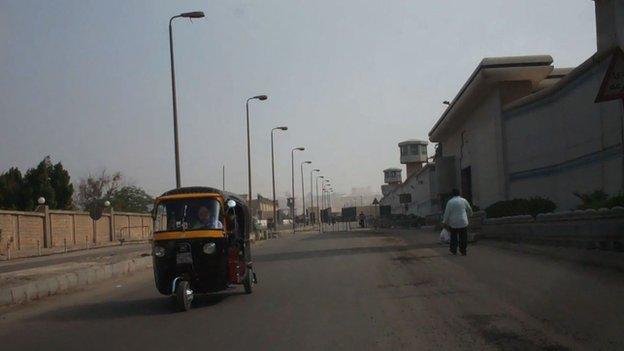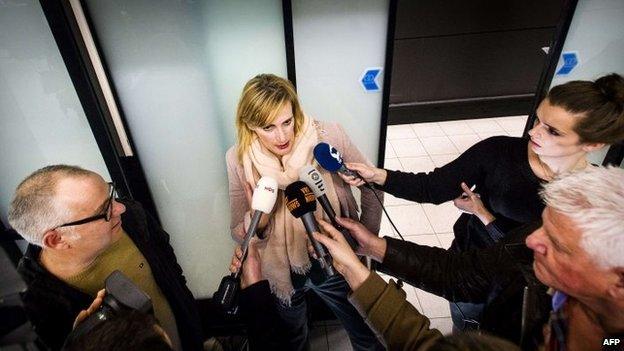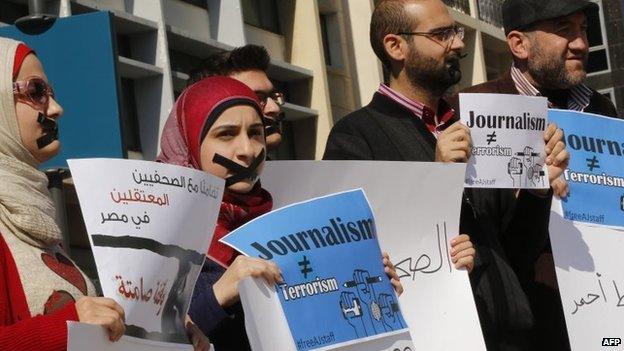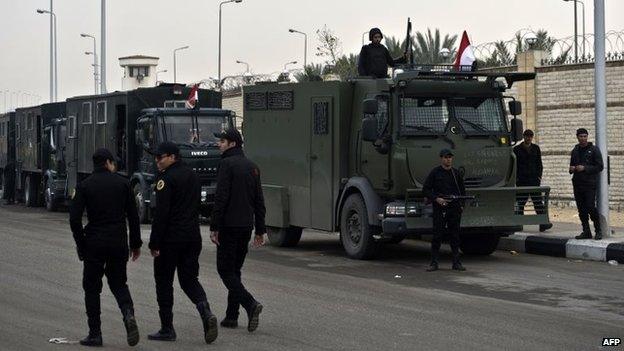Egypt's commitment to press freedom on trial
- Published
Al Tahrir TV broadcast the grainy footage of Mohamed Adel Fahmy and Peter Greste being questioned
Three journalists from al-Jazeera's English news channel go on trial in Egypt on Thursday, in a case which campaigners say is part of a sweeping crackdown on freedom of speech, reports the BBC's Orla Guerin in Cairo.
In mid-December, the award-winning Australian correspondent Peter Greste arrived in Egypt's capital for a routine assignment - his first in the country.
He checked into an upmarket hotel on the banks of the Nile, where al-Jazeera had a makeshift office, and started reading up on the story.
Just two weeks later, the former BBC correspondent became the story. He and two of his colleagues from al-Jazeera English - Egyptian-Canadian Cairo bureau chief Mohamed Adel Fahmy and Egyptian producer Baher Mohamed - were arrested. The trio was soon branded the "Marriott Terror Cell".
On Thursday, they are due to appear before a criminal court in Cairo on charges including broadcasting false news, and aiding or joining a terrorist organisation - as the Muslim Brotherhood was designated four days before their arrest - and endangering national security.
If convicted, they could be sentenced to several years in jail.
'Breaking the law'
Egypt denies the case is an attack on freedom of speech. It says the al-Jazeera journalists were working illegally because they did not have press passes.
"We have accredited more than 1,000 correspondents from foreign organisations, and they are working freely," one official says. "If you break the law, this is not freedom of expression."
Al-Jazeera is a regular target for Egypt's military-backed interim government.
The channel is owned by the government of Qatar, which backs the Muslim Brotherhood. Egypt regards the network as a mouthpiece for the Islamists.
But al-Jazeera's management deny allegations of bias.
"The charges just don't hold water," says Heather Allan, head of newsgathering for al-Jazeera English.
"Egypt is a very important story for us. We've always been there, we believe we have been very fair, and when they were picked up we thought it would last a day or two."
Instead, the journalists have now spent almost two months in Cairo's Tora prison complex, a much feared high-security fortress.
In a letter written from there last month, Peter Greste recounted being "locked in my cell 24 hours a day, for the past 10 days, allowed out only for questioning".

The three al-Jazeera journalists are being detained at Cairo's Tora prison complex
His colleagues were held separately in worse conditions, according to relatives.
They say Mohamed Fahmy, who entered prison with a dislocated shoulder, was forced to sleep on the floor, and is still waiting for medical treatment.
All three men are now sharing a cell, and are being allowed out for only an hour's exercise a day.
Their only offence, according to Peter Greste's prison letter, was "doing what any responsible journalist would - trying to make sense of the unfolding events with accuracy, fairness and balance".
But trying to provide balanced coverage is a dangerous business in Egypt these days - especially if that includes reporting on the Muslim Brotherhood.
The army removed it from power last July, along with President Mohammed Morsi - following mass opposition protests - and would clearly prefer it to disappear from view.
Fear returns
Thousands of miles away, at their home in Australia, Peter Greste's parents cannot comprehend how he and his colleagues wound up behind bars.
Peter Greste's father Juris Greste: "This is a dreadful, dreadful mistake"
"He's a professional journalist, of a high ethical standard," his father Juris told the BBC.
"He's been there for about two weeks, just getting his bearings, all of sudden he is accused of being a terrorist. You can't punish someone just because you don't like the message."
But critics say that is exactly what Egypt is doing - with scant legal justification.
The three men are among a group of 20 people indicted by the authorities at the end of January.
They also include the Dutch newspaper and radio correspondent, Rena Netjes, whose only connection with al-Jazeera was having a meeting with Mohamed Fahmy at the Marriott. She managed to flee Egypt, with the help of her embassy.
Many journalists in Egypt say they are now working, or trying to work, in a climate of fear - among them 23-year-old Mosa'ab Elshamy.

Dutch journalist Rena Netjes was one of 20 people indicted in Egypt who has since fled the country
The photojournalist has been documenting the tumultuous changes here since the revolution of 2011 that toppled President Hosni Mubarak. But lately, he has been taking fewer pictures because of the risk of being jailed.
"It is my biggest fear because I know it is going to take months, if not years, before getting out," he says.
"We have seen how journalists in Egypt have been detained for the most absurd reasons, and they continue to spend months of their lives [in prison], and a day in prison is like no other day."
Mr Elshamy has adapted by covering fewer stories and spending less time on the streets, but some of his colleagues have opted to leave the country.
"The change is huge and it's tangible," he says. "The little achievements and the little freedoms that people got from the revolution have been taken away. People are back to this fear."
Hunger strike
For the young photographer, concerns about press freedom are acutely personal.
His older brother, Abdullah, has been in prison since August.
The correspondent for al-Jazeera's Arabic channel was arrested while covering the violent dispersal of a pro-Brotherhood sit-in, during which hundreds of people were killed by the security forces. At the time the authorities insisted they had to restore security.

Trying to provide balanced coverage has become a dangerous business in Egypt
Unlike the other three al-Jazeera journalists, Abdullah Elshamy has no trial date. The 25-year-old has not even been charged.
On 21 January, he began a managed hunger strike in protest - he is accepting liquids, but no solid food.
"I do not belong to any group or ideology," he says in a statement posted on Facebook by his brother. "I belong to my conscience and my humanity. Nothing will break my will or my dignity."
Police state 'reinvented'
Campaigners say the al-Jazeera staff are among 13 foreign and locals journalists imprisoned in Egypt.
The country is now ranked among the top 10 jailers of journalists in the world.
The current attack on press freedom is the most severe ever, according to Gamal Eid of the Arab Network for Human Rights Information.

Some critics say the suppression of opposing voices is now worse than it was than in the Mubarak days
"There is no space for the opposing view," he says, comparing the country to Iraq under Saddam Hussein, and even Germany under Adolf Hitler.
The silencing of dissent goes far beyond journalists.
Political scientist Amr Hamzawy is facing charges over a tweet questioning a court ruling. The university lecturer and former member of parliament has even been barred from leaving the country.
"There are increasing signs of restrictions on freedom of expression for academics, for politicians and for intellectuals," he says.
"We are really looking at days worse than the Mubarak days, because even under Mubarak we had opposing voices being heard every now and then, but now its being suppressed. We are witnessing the reinvention of the police state."
When the case against the al-Jazeera journalists comes to court, it will be carefully watched abroad, including in the White House, which has called for the journalists to be released.
Many here believe they are being tried just for telling all sides of the story. Critics say that in today's Egypt that is tantamount to a crime.